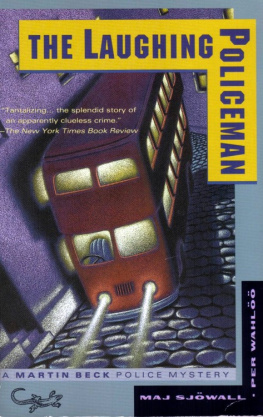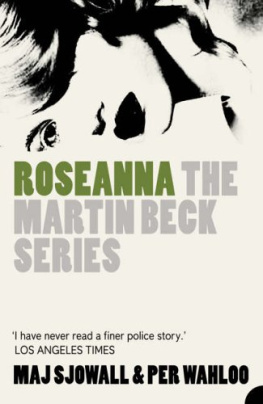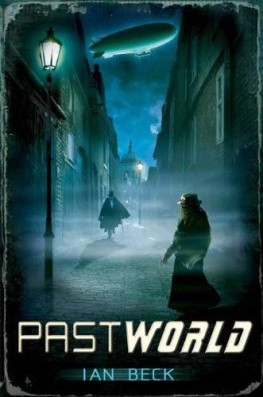Praise for
MAJ SJWALL and
PER WAHL
The Sjwall-Wahl style and stories are dramas that expose fascinating truths about modern life.
Chicago Tribune
The most superb new police mystery writer of recent years has been the tandem Maj Sjwall and Per Wahl.
Los Angeles Times
Sjwall and Wahl are still the best writers of police procedure in the world.
Birmingham Post
The whole series has an immediacy to it that is both honest and awesome. These are the kind of books you cant help but read in one sitting.
The Minnesota Daily
The [Martin Beck] series has maintained such a degree of excellence that comparisons are near impossible.
Minneapolis Tribune
MAJ SJWALL and
PER WAHL
THE TERRORISTS
Maj Sjwall and her husband, Per Wahl, wrote ten Martin Beck mysteries. Mr. Wahl, who died in 1975, was a reporter for several Swedish newspapers and magazines and wrote numerous radio and television plays, film scripts, short stories, and novels. Maj Sjwall is a poet. The books, together known as The Story of Crime, remain one of the greatest series of crime stories ever written.
THE MARTIN BECK MYSTERY SERIES
by
MAJ SJWALL and
PER WAHL
Roseanna
The Man Who Went Up in Smoke
The Man on the Balcony
The Laughing Policeman
The Fire Engine That Disappeared
Murder at the Savoy
The Abominable Man
The Locked Room
Cop Killer
The Terrorists
SECOND VINTAGE CRIME/BLACK LIZARD EDITION, JULY 2010
Translation copyright 1976 by Random House, Inc.
Introduction copyright 2010 by Dennis Lehane
All rights reserved. Published in the United States by Vintage Books, a division of Random House, Inc., New York, and in Canada by Random House of Canada Limited, Toronto. Originally published in Sweden as Terroristerna by P.A. Norstedt & Sner Forlag, Stockholm, in 1975. Copyright 1975 by Maj Sjwall and Per Wahl. This translation originally published in hardcover in the United States in slightly different form by Pantheon Books, a division of Random House, Inc., New York, in 1976, and subsequently published in paperback by Vintage Books, a division of Random House, Inc., New York, in 1977.
Vintage is a registered trademark and Vintage Crime/Black Lizard and colophon are trademarks of Random House, Inc.
This is a work of fiction. Names, characters, places, and incidents either are the product of the authors imagination or are used fictitiously. Any resemblance to actual persons, living or dead, events, or locales is entirely coincidental.
The Library of Congress has cataloged the Pantheon edition as follows:
Sjwall, Maj, 1935
The terrorists.
Translation of Terroristerna.
I. Wahl, Per, 19261975, joint author. II. Title.
PZ4.S61953Te3 [PT9876.29.J63] 839.7374 76-9987
eISBN: 978-0-307-74433-3
www.vintagebooks.com
v3.1
Contents
INTRODUCTION
As one might expect from a novel entitled The Terrorists, terrorism abounds in Maj Sjwall and Per Wahls final Martin Beck police procedural. But the chaotic forms that terror takes are not simply that of the political assassinations that bookend the narrative (the first in Latin America, the second in Stockholm). Sjwall and Wahl are after a much more expansive query of the very definition of terrorism. And so Martin Beck and his Murder Squad of disparate, contentious police officers dont just engage an impending act of violent insurrection on the streets of Stockholm. They must also solve the murder of a wealthy pornographer and contend with the destruction of an eighteen-year-old naf, Rebecka Lind, by the teeth of the social welfare system. All the while, their greatest enemy is not bullets or bombs, its the bureaucratic apparatus that exalts and rewards its own haplessness.
As this novelthe tenth in the seriesis Martin Becks swan song, its worth noting that in the annals of realistic fictional policemen, Beck stands a full head above most. He carries plenty of psychic scars and admits to a depressive personality, but hes not gloom laden to the point of masochistic self-pity that so often masquerades as a hard-boiled heros tragic worldview. Beck is a dogged worker bee entering his later middle-aged years with a healthy romantic life and no illusions about his place in the larger scheme of things. However exceptional, he is a civil servant. A great cop, yes, but in Sjwall and Wahls vision, a great cop is little more than a great functionary in a hopelessly flawed system. Becks talents include his good memory, his obstinacy, which was occasionally mule-like his capacity for logical thought [and finding] the time for everything that had anything to do with a case, even if this meant following up small details that later turned out to be of no significance. This is what makes a great copnot the gun, not outsized emotion, not a need to tilt at windmills and otherwise rage against machines. Thats the writers job. The cops job is to persevere, to examine the evidence, collate the data, push the papers, and work the case to its end. Because what stands in the way of that approachwholesale bureaucratic incompetenceis a constant in Sjwall and Wahls Sweden of 1975. Any man who can push a vision of the truth, however colorless, however minuscule, through the thornbush of total systematic inefficiency, is a hero. And Martin Beck is that man. So much so that the icy, hypercompetent terrorist, Reinhard Heydt, finds it incomprehensible that such a person would exist in a country like Sweden.
Ah, yes, a country like Sweden. One wonders how Sjwall and Wahl managed to live there through the writing of the ten Martin Beck novels, so negative is their depiction of not just the failed welfare state but the physical landscape as well, a shameless myth of blond goddesses and mineral springs that in reality gives birth every morning to a dismal, dirty, gray and depressing dawn. Its a late November world, compressed by a dark, swollen sky that hovers roughly four inches above your head until May. The courts dont work, the schools produce little but rot, and the ruling class skims the cream off the top and turns its back as the poor fight over the coffee grounds.
Nowhere are the inequities of the system more heartbreakingly personified than in Rebecka Lind. Rebecka understands society so little that she walks into a bank and asks a teller for money because shes heard banks give loans to those in need. She is not only turned down, she is arrested, and so begins her journey into the farcical justice system that Martin Beck works for. Rebecka, who is not interested in politics other than that she finds society as such incomprehensible and its leaders either criminal or insane, is the novels holy fool and sacrificial lamb, cast adrift by a society that proclaims to care for her then preys upon her as soon as her isolation leads to financial need. Over the course of the novel, Rebecka will cross paths with Martin Beck and his girlfriend, Rhea, as well as with Walter Petrus, the soon-to-be-bludgeoned pornographer. The corpulent, impotent Petrus casts pubescent girls in skin flicks so low-budget sex, from film to film, takes place on the same old couch, which occasionally changed covers. Petrus first hooks his ingnues on narcotics. Once they need the drugs and are willing to do anything to get their next fix, he reveals to them that anything will involve having sex on film. While Rebecka Lind escapes his grasp (only to end up in the systems callous grip), several children do not. The reader doesnt need a map to spy the connections Sjwall and Wahl draw between the type of terrorism in which Petrus traffics and that of both the ULAG assassins and the state.













